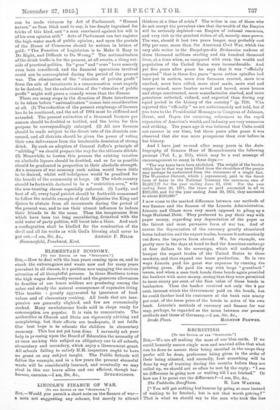TEMPERANCE REFORM.
IT° Tn. EDITOR OF THE " BPECTATOE:"1
SIR,—As one who has devoted the greater part of his life to the promotion of temperance reform, may I be permitted to thank you for discussing in your widely read pages this most pressing social problem, and for the courage with which you have handled one of the most difficult questions of the day P I am Hot, however, one of those who believe that the Kingdom of Heaven can be taken by violence, or that men or women
can be made virtuous by Act of Parliament. "Human nature," as Sam Slick used to say, is too deeply ingrained for tricks of this kind, and " a man convinced against his will is of his own opinion still." Acts of Parliament can but register the high-water mark of public opinion; and upon the portals of the House of Commons should be written in letters of gold: "The Function of Legislation is to Make it Easy to Do Right, and Difficult to Do Wrong." The nationalization of the drink traffic is for the present, at all events, a thing out- side of practical politics. Its " pros" and "cons" have scarcely even been considered, and the financial operations involved could not be contemplated during the period of the present war. The elimination of the "stimulus of private profit" from the sale of intoxicants is a consummation most eagerly to be desired; but the substitution of the "stimulus of public profit" might well prove a remedy worse than the disease.
There are many steps in the direction of State interference to be taken before "nationalization " comes into consideration at all. (1) The reduction of the present surplusage of licences has to be continued, and the act of 1904 must be stiffened and extended. The present extinction of a thousand licences per annum should be doubled or trebled, and the levies for this purpose be correspondingly enlarged. (2) All new licences should be made subject to the direct veto of the districts con- cerned, and all districts should be given the power of voting their own deliverance from the intolerable dominion of strong drink. By snob an adoption of General Joffre's principle of "nibbling" we should prepare the way for the ultimate clAdcle. (3) Meanwhile, to hasten this process the existing taxation on alcoholic liquors should be doubled, and as far as possible should be graduated in proportion to their alcoholic strength. As a measure of war economy such action would leave little to be desired, whilst self-indulgence would be penalized for the benefit of the community at large. (4) The whole country should be forthwith declared to be a "restriction-area," with the non-treating clause especially enforced. (5) Lastly, and best of all, every loyal patriot should be forthwith summoned to follow the notable example of their Majesties the King and Queen to abstain from all intoxicants during the period of the present war, and to use their utmost influence to induce their friends to do the same. Then the temperanoe fires which have been too long smouldering, drenched with the cold water of party polities, will burst into a blaze. And such a conflagration shall be kindled for the combustion of the devil and all his works as with God's blessing shall never be put out.—I am, Sir, &c., ARNOLD F, HILLS. Hammel:field, Pcnshurst, Kent.







































 Previous page
Previous page